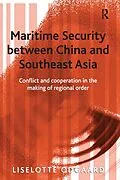Providing substantial evidence that strategic competition between the United States, China and South East Asia promotes stability, Liselotte Odgaard argues that security relations between China and South East Asia are profoundly affected by disputes over maritime space and territory in the South China Sea. Suitable for scholars and graduate students of international relations, international law, security studies, conflict management and regionalism, this text will also be invaluable supplementary reading for undergraduate courses.
Autorentext
Liselotte Odgaard is Assistant Professor in International Relations, Department of Political Science at the University of Aarhus, Denmark. She has written articles on East and Southeast Asian security published by Contemporary Southeast Asia, Kluwer Law International and IBRU Boundary and Security Bulletin.
Zusammenfassung
Arguing that security relations between China and Southeast Asia are profoundly affected by disputes over maritime space and territory in the South China Sea, the author demonstrates that the primacy of strategic competition over strategic partnerships promotes the emergence of a structure of deterrence, encouraging South East Asia to side with the United States to balance the military power of China. Combining the concepts of international disputes and order, the book establishes a framework designed to focus on periods of transition where international regulatory mechanisms are out of step with developments in the security environments of states. Features include: - Substantial evidence that strategic competition between the United States, China and South East Asia promotes stability. - A comprehensive account of military, diplomatic, economic, historical and legal aspects of security environments of states. Suitable for scholars and graduate students of international relations, international law, security studies, conflict management and regionalism, it will also be invaluable supplementary reading for undergraduate courses.
Inhalt
Contents: Maritime security between China and Southeast Asia; The English school and the study of order; The Spratly dispute: from non-essential to essential; A governance structure for the South China Sea; An organizational network for the South China Sea; A code of conduct for the South China Sea; A regional order in the making; Bibliography; Index.
